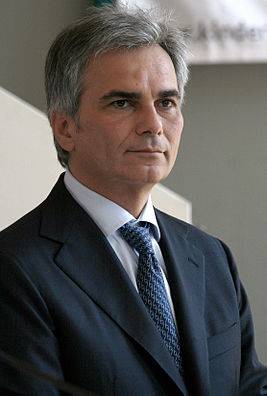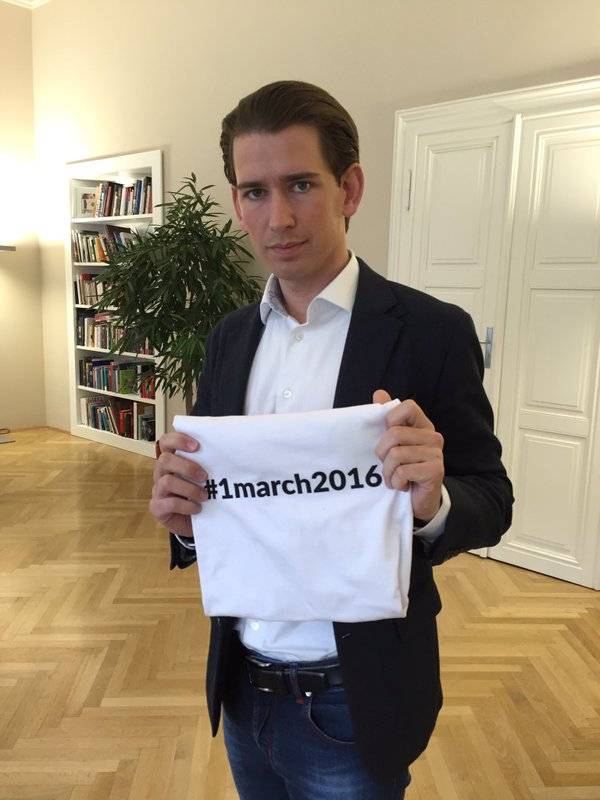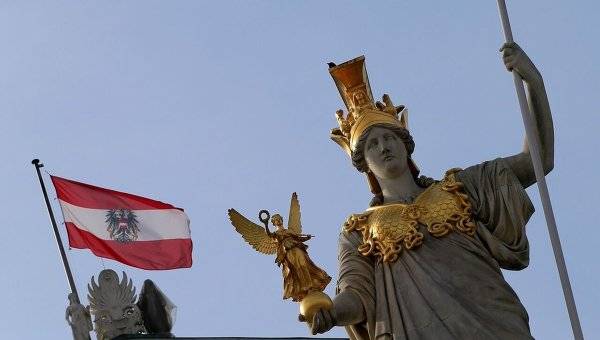Austria is waiting for Chancellor Kurtz. Will a young politician solve the problem of migration?
However, now there are significant differences between the Austrian People's Party and the Christian Democratic Union of Germany. They are associated with the policies of Angela Merkel, who holds the post of German Chancellor. As the leader of the CDU, Angela Merkel actually betrayed the conservative values of German society, opening the country's borders for uncontrolled migration and creating the most favorable regime for people from African and Middle Eastern countries. Today, Merkel personifies the course of the European Union, which implies the adoption of values directly opposed to European conservatism - supporting migration from the East and the South, promoting unconventional sexual orientations, etc. In Austria, the situation is somewhat different.

First of all, it should be noted that, until recently, Austria was one of the closest partners of Germany. It affected not only linguistic and cultural unity, but also the common positions of the leaders of the two states, including on the same boiling migration issue. December 2008 to May 2016 the post of Austrian Chancellor was Werner Fayman, the representative of the Social Democratic Party of Austria. He was elected to this post, among other things, with the support of the Austrian People’s Party, which in 2008 year specifically formed a coalition with the Social Democrats. Fayman was one of the initiators of the "opening of doors" for migrants from eastern and southern countries. Austria under his leadership decided to set an example to other European countries and invited tens of thousands of Africans and Asians to stay in the cities of the country.
This led to quite predictable consequences and natural discontent of the indigenous population. First, the number of people from African and Asian countries in Austria has more than doubled compared with a decade ago. It was not only the constant arrival of more and more migrants, but also a very high birth rate in the families of Afghans, Syrians, Libyans, Somalis and other new residents of the country. Secondly, in proportion to the increase in the number of migrants, the expenses of the Austrian budget began to increase. After all, it is not a secret that many migrants are not going to work, but expect to live all the time for generous donations and benefits, also giving birth to children.
Public discontent with the policies of the Austrian leadership has done its job. Austria became the first European state among the “apologists of migration” to suddenly completely change its political course. The same Werner Fayman, who at the beginning of the chancellorship almost invited everyone to Austria and declared that in Europe it was necessary to accommodate at least a million “refugees”, suddenly announced the introduction of a “state of emergency of migrants”. After this decision, Austria announced the complete cessation of the reception and placement of new migrants. For the leadership of the European Union, this act of Vienna was a real blow. After all, no one in Brussels expected such a “provocation” from the “trustworthy” Fayman.

Following the closure of borders for migrants, Austria went even further. Vienna has begun negotiations on further cooperation with the “European dissidents” - Hungary, the Czech Republic, Slovakia and Poland, who are in opposition to the mainstream policy of Brussels and sharply criticize the placement of African and Asian migrants in the European Union. In fact, historically, Austria and the listed countries have a lot in common. To begin with, up to 1918, Hungary, the Czech Republic, Slovakia and part of Poland were part of the unified Austro-Hungarian Empire, together with Austria itself. The tradition of political interaction that was not simple, but still had a very long history, useful in the current situation. Vienna, Prague, Bratislava, Budapest and Warsaw had a common task - to prevent further infiltration of migrants, and to solve this problem it is quite possible to sacrifice loyalty to the principles of "European solidarity" declared by Brussels. The European Union is in crisis and now the country that is thinking is winning, first of all, about its own interests.
If we do not talk about radical non-parliamentary groups, whose influence on the Austrian policy is small, then the most tough position regarding the migration course of the European Union in Austria is taken by the current Foreign Minister Sebastian Kurz. He is a representative of the Austrian People’s Party, a well-known right-wing politician and, moreover, the most likely candidate for the position of chancellor in the upcoming parliamentary elections.
Sebastian Kurtz - a very remarkable person. First, he is one of the youngest European politicians of this level and perhaps the youngest foreign minister - if not in the world, then at least in Europe. Secondly, he is not just the Austrian Foreign Minister, but also the Chairman of the Organization for Security and Cooperation in Europe. At the same time, Sebastian Kurtz is only thirty years old. He was born on August 27 1986 in Vienna in an ordinary family of Austrian intellectuals. My father worked as an engineer, and my mother worked as a teacher. Kurtz began his political career in early adolescence, practically in his teens. At seventeen, he joined the youth wing of the Austrian People's Party, and already in 24, he was elected from the party to the city council of Vienna.
In 2011, 25-year-old Kurtz became the Secretary of State for Integration - one of the leaders of the Federal Ministry of the Interior. Interestingly, by this time, in fact having received a ministerial portfolio, Sebastian Kurtz was still a student and studied in the thirteenth semester of the law faculty. As State Secretary for Integration, Kurtz was responsible for settling foreign migrants in Austria. For three years he has been working on this issue and has acquired quite a broad idea of what the problem of migration in Austria really is. In 2013, 27-year-old Kurtz was appointed Austrian Foreign Minister, becoming the youngest foreign minister of Austria, Europe and the world. At the same time, he asked to leave him the post of integration secretary, apparently for reasons of the need to maintain control over the migration policy of the Austrian state.

Despite his age, Kurtz is an experienced enough, and most importantly, a far-sighted politician. He perfectly captured the mood of the Austrian voter in the current political situation in Europe and knows what to do with the main focus. Now Kurtz says a lot about the migration situation in the country and in Europe as a whole. For example, Kurtz said that it is necessary to block the famous Mediterranean way of migrants, in which illegal immigrants from Africa and the Middle East come to Europe. As is known, the Mediterranean route begins on the North African coast - in Libya and Tunisia, then migrants on boats and boats cross the Mediterranean Sea and find themselves in Italy, from where they are trying to penetrate further - into more prosperous European countries. To prevent migrants from Italy from entering Austria, Kurtz proposes to install special outposts on the Brenner Alpine Pass.
The need for overlapping the Mediterranean route Kurtz justifies the fact that the overlap of the Balkan route has already yielded results. When a number of Eastern European states, including Hungary, blocked the entry of migrants from the Balkan Peninsula, their influx actually almost stopped. At the same time, migrants did not settle in Greece. If the leaders of the European Union claimed that any overlapping of one of the migrant routes would cause the settlers to settle in Italy or Greece, then the experience of closing the Balkan route showed that in Greece African and Asian "refugees" are not going to settle. For them, the ancient land of Hellas is not a prosperous country. You will not get much social benefits and subsidies here, the population is less “tolerant” to antics than in Germany or the Scandinavian countries, there is no work even for indigenous people.
Another Kurtz fad is the propaganda of integrationist politics. According to the minister, all foreign migrants should be integrated into the Austrian society. From this conviction, Kurtz also follows his decisive attitude towards such religious practices of the Austrian Muslims as wearing the niqab and burqa. In addition, Kurtz advocates the closure of kindergartens created on the basis of religious principles, as he is convinced that preschool institutions should be engaged in preparing children for school, and not in religious education. Naturally, such statements by Kurtz cause great vigilance on the part of numerous Austrian migrant communities in Islam.
Positioning himself to be a great patriot of Austria and a supporter of migrant integration, at one time Kurtz was able to lobby for the allocation of additional funds from the Austrian budget to finance German language courses for migrants. According to the minister, the integration of foreign immigrants into Austrian society begins with the development of the language. Another obvious achievement of Kurtz is the separation of primary school for the bulk of Austrian children and those children who have just arrived in the country and do not speak German. It has long been known that in this case children who do not speak the language “pull down” the rest of the majority of the class, since teachers are forced to spend time constantly pulling up lagging migrants. As a result, indigenous children receive less knowledge, and the quality of their education deteriorates. This problem, by the way, is relevant not only for Austrian schools.

On the other hand, Kurtz’s position is supported by many Austrians, who fear the growth of a foreign culture population in the country and the arrival of new migrants from African and Asian countries. Actively promoting his image as a fighter against uncontrolled migration, Kurtz plays on the national and patriotic feelings of the conservative-minded part of the Austrian population. But besides the conservatives, the Foreign Minister counts on the support of the Austrian youth. This is also not surprising, since Kurtz himself is a young man. He is much closer in age to students than other top-level Austrian politicians. Moreover, Kurtz is prone to extravagant advertising campaigns, which only give him popularity among the youth. Photos accompanied by pretty girls seem to emphasize that Kurtz, despite his appearance of a typical dandy, is a supporter of the traditional orientation - and this also cannot flatter those who still hope for the revival of traditional European values in Austria.
Turkish President Recep Erdogan is also a constant target of criticism from Kurtz. Among European politicians, Kurtz has a reputation as one of the harshest critics of modern Turkey. In particular, he has repeatedly stated that for Turkey, any possibility of joining the European Union should be blocked. Naturally, Kurtz’s policy of Recep Erdogan in Turkey itself, in relation to its political opponents and opponents, is very negative.
Sharply inclined towards Turkey, Kurtz is showing complete friendliness to Eastern European countries. Poland, Hungary, the Czech Republic, and Slovakia are considered by the foreign minister as the most optimal allies for modern Austria. Cooperating with them for Vienna, according to Kurtz, is much more profitable than following in the wake of German policy.
But, unlike the Hungarian Viktor Orban, Kurtz does not yet demonstrate a desire to support Russia. If the Hungarian prime minister is perhaps the only one of politicians of such a rank, he allows himself to speak out in support of the lifting of anti-Russian sanctions, then Kurtz is more cautious. So, he says that the gradual lifting of sanctions should be related to resolving the situation in the Donbas and Russia's implementation of the Minsk agreements. However, nothing else can be expected from the OSCE chairman in the current situation. But it is obvious that, compared with many other "wolves" of European politics, the young Austrian minister is more friendly towards Russia.
Information